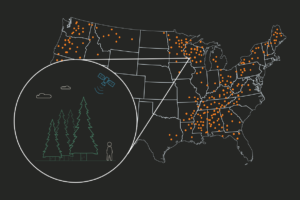Earlier today, we took the incredibly difficult step of reducing the size of our team by 40%. This is the hardest decision we’ve had to make since founding NCX over a decade ago. It’s painful to part ways with so many from our unbelievably talented team of foresters, scientists, operators, and engineers. We made this decision to ensure we can execute on our mission to create real, measurable climate impact at scale in this critical decade, even amidst the confusion, uncertainty, and turbulence that are roiling the carbon market today.
We’ve already reached out to affected NCXers with important details on next steps including severance, continuation of benefits, outplacement support, and timing. Though we recognize there’s little we can say to remove the pain from this process, we are personally committed to working with each affected NCXer with the respect they deserve.
While necessary, we recognize that’s not sufficient. It’s equally important to share the larger context for this announcement – the conditions, decisions and realities that brought us here, as well as what we see ahead for NCX following the changes we’re making today.
Together, we founded NCX to tackle the most important problem of our generation: climate change. Our work is based on the simple principle that forests are fundamental to the climate solution. By connecting companies to the landowners, habitats, and communities they impact through our forest carbon marketplace, we’ve enabled the creation of high-quality, nature-positive carbon credits with immediate, measurable benefit for the climate. Our approach is designed to operate differently than what came before – and create a real opportunity right now to make a long-term difference at large scale.
We knew from the start that we’d face an uphill battle to win people over to our approach. It took a full decade to hone our understanding of what was needed in the market and build out the technical tools and data to make it work. We only felt ready to raise capital when a raft of new corporate sustainability commitments gave us conviction that the market was ready for what we could offer, and we worked quickly to add the talent needed to meet the moment.
So what did we get wrong? Of course, we’re not immune to the economic pressures of the last year and forward-looking macroeconomic uncertainty which are impacting technology companies big and small. But to chalk up today’s announcement solely to those external conditions wouldn’t be fair, and we owe you a more thorough accounting of how we got here:
- We believed 2022 would be the year of growing consensus and less confusion on the markers of quality in nature-based solutions. Instead, we saw the reverse. Articles pointed out many of the things we designed our program to overcome: carbon offset projects going up in smoke in major wildfires on the West Coast, projects being cut down a few years into a century long contract, or early projects just not representing change in forest management. But this coverage caused concern and confusion about what is “good” that has now led to broad cynicism about nature-based solutions and the perception that it’s safer for companies to do nothing than to invest in nature. Our sector, as a whole, has a lot more work to do here to earn the confidence needed to meaningfully scale the adoption of nature-based solutions.
- We believed the market was ready to value near-term, measurable, large-scale carbon removal through nature-based solutions, and that is not yet true. Instead, the conversation focused further on the potential for still unproven solutions to develop in the future. We have so far failed to successfully make the case for nature-based solutions today as a necessary bridge to get to that future. This too, is an area where we have much to do.
- We haven’t acted quickly enough to expand our product offerings. Many stakeholders had helpful input and questions regarding our current one-year harvest deferral carbon credit. While some felt comfortable moving forward with us based on the data and science we provided to answer those questions, it’s clear that others would have preferred more changes to our approach. Going forward, we will bring greater focus to understanding root concerns, internalizing that feedback, and translating it into new product offerings that both provide clear benefit to the climate and give stakeholders confidence in our work.
We are unwavering in both our belief in the critical importance of our mission and the values that guide our approach. But putting NCX in a position to bring that mission to fruition requires that we make these painful changes and set the foundation for long-term success. It’s simply not enough to believe in what we’re doing and wait for others to come around to our point of view. We must, and will, make a transparent and evidence-based case for the value of the solutions we help forest landowners bring to market for buyers. We’re also committed to listening better to market feedback, testing new product offerings that take that feedback into account, and, above all else, honestly assessing the resulting data on what the market values.
There are no two ways about it: this is a hard day. But we’re dedicated to this mission and this is not where we stop. The simple fact remains that what we do this year matters and without immediate changes to the management of our planet’s forests, we cannot sequester sufficient carbon quickly enough to avoid the worst damages of climate change. The work of conservation and climate change mitigation has been challenging from the start. The road ahead for our contribution to that cause will be difficult, but we’re committed to traveling it. We owe it to you, to future generations, and to the planet.
– Zack Parisa and Max Nova, Co-founders, NCX



